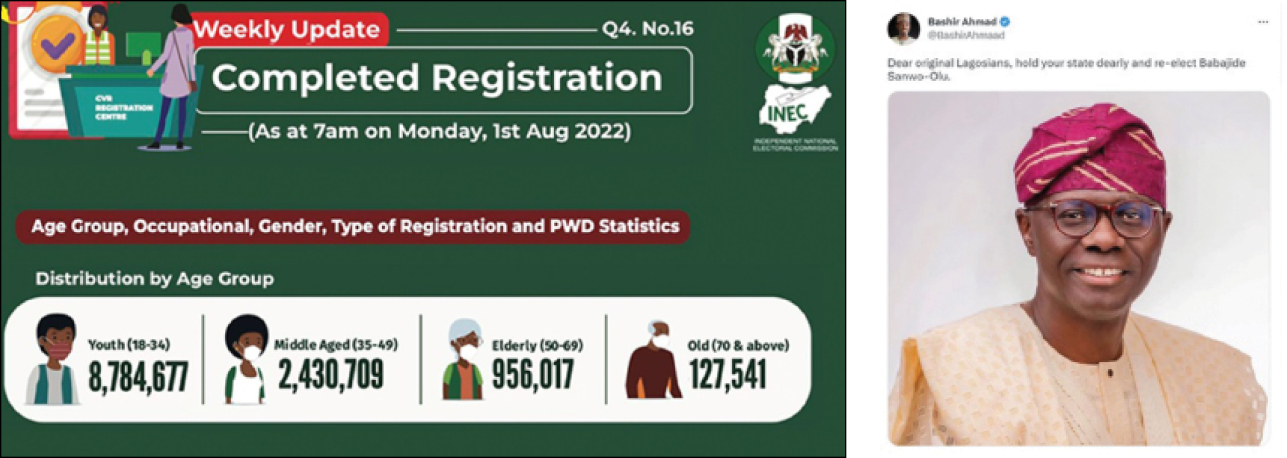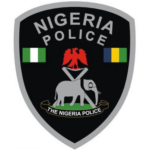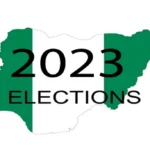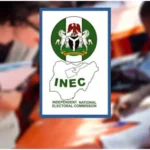The 2023 elections in Nigeria saw an increased interest from the youth who make up the bulk of the population. However, the exercise had the lowest voter turnout since the return of democracy in 1999. With the country governed by a mixture of federal and central systems of government, voting along ethnic and religious lines has been a voting pattern that politicians have capitalised on to gain power.
Based on reports, out of the 93 million eligible voters, approximately 25 million Nigerians actively participated in the voting process. The provided chart indicates a declining trend in voter turnout, despite an increase in the number of registered voters.
A screengrab of the voter turnout during various Nigerian elections. (Source: INEC)
Traditionally, politicians conducted physical campaigns to attract voters before the election. However, with evolving campaign strategies, social media emerged as a valuable platform for spreading political messages and garnering voter support.
Furthermore, the unprecedented interest shown by the youth in the 2023 elections may have contributed to the amplified political discourse on online platforms. Unfortunately, these discussions often contained hateful comments and posts that fostered divisions among different ethnic groups. The unprecedented interest in the 2023 elections by the youth engendered the amplification of election issues on social media, which was seen as a massive tool for electioneering campaigns. Social media became the go-to platform for political aspirants and their supporters to voice their opinions and get their messages across to the electorate.
A screengrab of the distribution of age group voter registration statistics. (Source: INEC)
As the election results came in, they brought out winners and losers, and the outcome has seen an increase in the propagation of hate speech, which has culminated in ethnic profiling and conspiracies to elicit support from varied groups of the political divide. False information was widely spread on social media, further aggravating the already divided political climate.
The aftermath of Nigeria’s 2023 election has brought to the fore the fault lines of the major ethnic groups in the country. The spread of hate speech and false information on social media has fueled ethnic profiling, creating an “us vs them” mentality. This toxic campaign of ‘us’ against ‘them’ would inadvertently create room for more voices on the need for the country to separate along ethnic lines, thereby depriving the country of the nationhood it craves since independence.
Voting along ethnic lines
Nigeria is home to one of the most diverse arrays of ethnic groups globally, with a believed count of over 250 ethnic groups within the country. However, the three predominant groups, namely the Hausa, Yoruba, and Igbo, collectively constitute 60 percent of the country’s population. Historically, the Hausas are the largest group, primarily located in the northern region, while the Yorubas reside in the southwestern region and the Igbos in the southeastern region.
A screengrab of the distribution of ethnic groups in Nigeria. (Source: Statista)
To promote national integration, Nigeria operates under a combination of federal and central systems of governance. Nevertheless, the political landscape often generates politicians aligned with specific ethnic and religious affiliations, which influences voting patterns and their ascent to power. This aspect became apparent in the outcome of the 2023 presidential election, wherein the three major political parties received the highest votes in regions associated with their respective candidates.
For instance, the candidate of the All Progressive Congress (APC), Bola Ahmed Tinubu, who is Yoruba, secured the highest number of votes in the southwest region. On the other hand, the candidate of the Peoples Democratic Party (PDP), Atiku Abubakar, representing the Hausa/Fulani ethnicity, garnered the highest votes in the northern region. Similarly, the candidate of the Labour Party (LP), Peter Obi, an Igbo, obtained the highest votes in the southeastern region.
What the law says on hate speech
According to the United Nations, hate speech is defined as an offensive discourse that targets a group or individual based on inherent characteristics, such as race, religion, or gender, and has the potential to threaten social harmony. The UN further states that hate speech can occur both offline and online, with the intention to discriminate against or degrade an individual or group.
Hate speech specifically highlights real or perceived aspects of an individual’s or group’s identity, including religion, ethnicity, nationality, race, colour, descent, and gender, as well as other characteristics such as language, economic or social background, disability, health status, or sexual orientation, among others.
Similarly, the Open Society Justice Initiative defines ethnic profiling as the utilisation of actions by law enforcement that lead to general assumptions about a group based on their race, ethnicity, religion, or national origin, rather than focusing on individual behaviour or objective evidence when determining suspicion for discretionary law enforcement actions.
In Nigeria, measures have been implemented to prevent the use of hate speech for defaming political opponents during elections. Section 97(1A) of Nigeria’s Electoral Act, 2022 prohibits any candidate, person, or association from engaging in campaigning or broadcasting based on religious, tribal, or sectional reasons with the aim of promoting or opposing a particular political party or candidate.
Additionally, Section 92(1A) prohibits political campaigns or slogans from containing abusive language that directly or indirectly may harm religious, ethnic, tribal, or sectional sentiments.
How election loss triggered a rise in hate speech
The 2023 presidential election in Nigeria saw the All Progressives Party (APC) win the presidency, but the loss of Lagos State, the stronghold of the presidential candidate Bola Ahmad Tinubu, a Yoruba, to the candidate of the Labour Party (LP), Peter Obi, an Igbo, led to an increase in hate speech against the latter’s tribe. Lagos is the economic hub of Nigeria and is home to people from all tribes who seek economic prosperity.
The Igbos are a significant part of the minority tribes in Lagos state and needed representation in the political scene. Their large numbers contributed to Obi’s victory in Lagos state, but the APC was determined to regain power through the gubernatorial race. To ensure their victory in the gubernatorial election, where the incumbent Babajide Sanwo-Olu an APC candidate, a Yoruba, was seeking another term in office, the APC resorted to using social media to stir ethnic appeal and spread hate speech against the Igbos.
The spread of hate speech on social media fueled ethnic profiling, creating an “us vs them” mentality. The Igbo community was portrayed as land grabbers who intend to hijack the affairs of the state, and these narratives incited actions that would deprive Igbos of their inalienable right to vote and be voted for in a federal system of government. False claims that Igbos are a threat to the stability of Lagos state led to a campaign to create a divisive environment in the state.
The Special Assistant on Digital Communications to Nigeria’s President, Bashir Ahmad, made a not-pleasing post on social media urging the original inhabitants of the city to vote for the incumbent governor in the polls.
A screenshot of the tweet that was seeking support through the use of unfavourable language. (Source: Twitter)
The tweet by Ahmad received a viewership of ~1,200,000 views and total interaction of 13,116.
The pervasiveness of hate speech in falsifying
During the election, politicians and their supporters employed derogatory narratives to characterise members of the Igbo community, portraying them as land grabbers with intentions to seize control of the state’s affairs. Consequently, these perpetrators incited and encouraged actions that aimed to deprive the Igbos of their inherent right to vote and participate in a federal system of government that promotes unity, nationalism, and interethnic integration through marriage or residency.
The proliferation of hate speech further fueled ethnic profiling, with false information and conspiracy theories being disseminated across Nigeria’s cyberspace. This resulted in numerous posts that propagated the notion of the Igbos as intrusive settlers, seemingly preoccupied with the affairs of other regions while neglecting their own place of origin.
The presidential campaign spokesperson of the APC, Bayo Onanuga, tweeted after the party’s victory in the Lagos gubernatorial election, expressing that 2023 should mark the end of Igbo interference in Lagos politics. He emphasised that Lagos is Yoruba land, not No Man’s Land or the Federal Capital Territory, and urged the Igbo community to focus on their own affairs. The tweet, which was highly divisive, attracted significant attention with ~5,500,00 million views, and a total social interaction of ~ 11,848. The tweet’s viral nature demonstrates the impact it had on public discourse and highlights the divisive sentiments it evoked.
A screengrab of the tweet from the APC spokesperson. (Source: Twitter)
Another instance involves Femi Fani-Kayode, who made a similar assertion through a thread of tweets, reinforcing why Igbos are no longer welcomed in the city of Lagos. He expressed that unless the Igbos swiftly and significantly change their attitude, it might be more beneficial for them to return to their place of origin.
A screengrab of the thread of tweets asserting Igbos’ are welcome in Lagos. (Source: Twitter)
Amidst the unfolding situation, a manipulated image began circulating on Twitter, featuring an unidentified individual waving a Biafran flag. The Biafran flag is associated with calls for Igbos to secede from Nigeria and assert territorial claims, suggesting that they intend to incorporate the city into their own territory. A reverse image search conducted on the picture revealed that the person holding the flag was superimposed onto a photograph of a bank in Lagos. To extend the reach of this narrative, a coordinated hashtag, #DefendLagos, was employed to amplify its dissemination on Twitter. The widespread use of this hashtag aimed to propagate the notion that Igbos harboured ulterior motives for their involvement in the politics of Lagos State.
A doctored image was used to claim that a secessionist flag, Biafran, was waved in Lagos (Source: Twitter)
The hashtag received ~6,100 mentions on Twitter, experiencing a notable surge in activity between the dates of 05-11 March 2023. This uptick in engagement occurred just a few days prior to the Lagos gubernatorial elections scheduled for 18 March 2023.
A screengrab of total mentions for the #DefendLagos.(Source: Meltwater)
Some sample posts from the #DefendLagos:
Sample posts from some of the accounts that used the #DefendLagos. (left, right) (Source: Twitter)
Ethnic profiling as a consequence
A Twitter user residing in Lagos was targeted in an online attack solely because she was of Igbo ethnicity. The user innocently shared a picture of herself at work, which was maliciously exploited to perpetuate the false stereotype that Igbos are taking away job opportunities that rightfully belong to Yorubas in the state.
A screengrab of the malicious online attack on a Twitter user. (left, right)(Source: Twitter)
In response to this incident, the hashtag #YorubaJobsforYorubapeople started trending as a means to demand the removal of individuals from Igbo background from such opportunities.
An example tweet emphasising the exclusivity of Yoruba jobs for individuals of Yoruba descent. (Source: Twitter)
The hashtag #YorubaJobsforYorubapeople received ~13,400 mentions on Twitter, experiencing a significant surge in activity during the initial two days when the hashtag started trending. However, subsequently, the momentum gradually subsided, and the hashtags eventually faded away.
A screengrab of total mentions for the #YorubaJobsforYorubapeople.(Source: Meltwater)
The incitement observed on social media had offline consequences where a market predominantly occupied by Igbo traders was engulfed in flames three days after the presidential election. While the police investigation into the cause of the fire is still ongoing, speculations emerged suggesting that the incident was a deliberate act of arson aimed at targeting Igbo businesses.
Eyewitnesses reported that masked individuals set the market ablaze during the early hours of 08 March, resulting in the tragic death of a 65-year-old security guard. The circumstances surrounding the incident gave rise to conflicting information online, with some attributing blame to unidentified perpetrators, while others accused a local government official of sponsoring the arson.
Unfortunately, certain netizens exploited the situation to spread baseless conspiracy theories, claiming that there were plans to attack additional markets dominated by Igbo traders in the city. These allegations were made without any substantiated evidence, further fueling tensions. Consequently, suggestions were made for the affected group to establish vigilante groups to protect their businesses, which in turn heightened the already volatile situation.
A false image was used to create tension claiming the Igbos’ businesses were being targeted. (Source: Twitter)
However, a reverse image search conducted on the image revealed that it had previously been featured in a news story reporting a fire incident at the same market in 2021. This discovery cast doubt on the authenticity of the image and its association with the recent incident. Furthermore, a diligent netizen physically examined the market and confirmed that the fire alarm raised in relation to the picture was indeed false. These findings strongly suggest that the picture circulated on social media was misleading and did not depict the actual situation at the market.
The reverse image search confirmed this image was used to report a similar incident concerning the same market in 202. (Source: Daily Nigerian)
Additionally, another tweet circulated false information alleging that Igbo businesses were being targeted in the northern region. The dissemination of such baseless reports exacerbated the already divisive atmosphere.
A misleading post claiming igbos businesses were burnt in the northern part of the country (source Twitter/Archive.is)
Ethnic profiling on the d-day of gubernatorial election
On the day of the gubernatorial election, disturbing reports emerged indicating that certain individuals of Igbo ethnicity were being prevented from exercising their right to vote. These reports came in the wake of a video circulating online, featuring a government official from the state instructing individuals who were not planning to vote for the All Progressives Congress (APC) party to abstain from participating in the election.
Sample posts of the videos which were instilling fear to Igbos voters. (left, right) (Source: Twitter)
Furthermore, another video surfaced in which an APC supporter can be heard urging others to vote for the APC and threatening repercussions if any Igbo individuals were observed voting differently. These incidents contributed to an environment of intimidation and discrimination.
The video where the supporters were urging voters. (Source: Twitter)
Regrettably, even those who reached their respective polling units faced difficulties, as Igbos were subjected to profiling during the election.
Conclusion
The divisive political climate that unfolded during the 2023 polls significantly deepened the rift among different ethnic groups within the country. The toxic narrative of ‘us’ versus ‘them’ that permeated the campaign had far-reaching consequences. It inadvertently nurtured an environment where more voices advocating for the country to separate along ethnic lines emerged, intensifying the fragmentation of the nation. This detrimental outcome risks depriving the country of the cohesive nationhood it has sought to achieve since gaining independence. It underscores the urgent need for reconciliation, fostering unity, and embracing the diverse cultural fabric that defines the nation.
This article was produced with mentorship from the African Academy for Open Source Investigations (AAOSI) to tackle disinformation that undermines our democracies, as part of an initiative by the International Centre for Journalists (ICFJ) and Code for Africa (CfA). Visit https://disinfo.africa/ for more information.

 Join Daily Trust WhatsApp Community For Quick Access To News and Happenings Around You.
Join Daily Trust WhatsApp Community For Quick Access To News and Happenings Around You.


